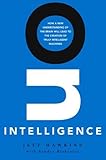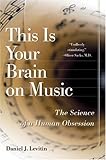I mentioned music in each of the last two posts as a digitizable creation that people enjoy enough to pay for. So what is it about music that is so great? I’ve been asking myself this question for years, and now seems like the time to try and tackle it.
I’ve always enjoyed music – from playing the trumpet in elementary school, owning a $230 portable CD player in 1993, to being an iPod man today. Practically every spare dollar I earned between the ages of 13 and 17 was spent on CDs. I love and appreciate all kinds of music – classical, rap, rock, alternative, opera, techno, Hawai’ian (especially Hawai’ian), even country (Claire from 9th grade, if you’re reading this (which I’m pretty darn sure you’re not), it took over 15 years and I’m still not a fan, but I can say now that I appreciate country music). But now I don’t listen to music very often. In fact hardly at all. I have my iPod running most of the day, but I listen to podcasts, sweet delicious podcasts of all stripes that keep me informed and help me learn new things. What’s the difference between me now and when I was in high school (besides the notably reduced mental redardation and 70 extra pounds)?
Music and the Brain
My answer has come from my interest in neuroscience and artificial intelligence. Jeff Hawkins’ book On Intelligence (God bless him for writing it) stresses the temporal nature of the brain – how learning, memory, even sensory perceptions like vision and hearing only work on data that changes through time. Our brain works by processing related events connected by the sequence they occur in – kind of like musical notes! Music speaks our brain’s native language! No compiling, no byte code, etc – it operates directly on our abstract syntax tree (that’s my analogy, don’t hold it against Jeff). That is why it’s easier to remember song lyrics than the words of a speech – the lyrics are attached to a musical sequence that burns into your mind.
[Someday I’m going to give On Intelligence a proper writeup, but I don’t have it in me right now. It is definitely the most exciting book I’ve read in the last couple years. Whoops, gotta stop talking about it – my pulse is starting to race.]
Dan Weinreb recently wrote a review of a book called “This is Your Brain on Music” that I haven’t read but am dying to based on his review. Please read his entire review (and the book too!) but check out these nuggets on how entwined music is in your brain:
-When you hear a musical tone, there are neurons in your brain that send electrical pulses at exactly the same frequency as the note
-most people can recreate the exact tempo of a song they know, to within a few percent, even if they’re not musically trained
-your brain can distinguish between musical consonance and dissonance before your neocortex (higher, human level thinking) gets involved
I find all of that ridiculously fantastic, and if you’re at all interested in thought and music enough to keep listening (er, reading) to me, then you should check out those two books.
Example time! Look at the following sentence:
Janet owned a baby sheep.
Just a normal sentence that’s super easy to forget. Now look at this slightly different wording, set to music:
The words form a sequence (same as in the first sentence), the musical notes form a sequence, and each note links to its word, so even if you couldn’t say the sentence exactly by itself, you can fill in missing words if you sing it. It’s a heavily connected graph.
Emotional Amplifier
That’s the mechanics of why music works on our brains, but most people listening to music aren’t trying to accurately remember sentences. What’s more important is that since music talks directly to our brains, it can cause our brains to affect our emotions, hormones, and all of the other chemical goodness that our brain does without us asking it to. So music can affect your mood, and usually, no matter what mood you’re in, you want more of it. When I’m discouraged or wistful, Fade to Black by Metallica captures my mood perfectly. When I’m exceptionally grateful and loving, Con Te Partiro by Andrea Bocelli amplifies it (I almost cried with joy and love for my family when I heard him sing a lullaby version of it to Elmo on Sesame Street). When I’m frustrated and stubborn and need to unlock the power of my brain to triumph over a knotty problem, Beethoven’s Egmont Overture is the key – rarely can I get through the whole 9 minutes without figuring out how to triumph over what was impeding me, or at least get in the frame of mind to solve the problem shortly thereafter. Regardless of what you’re feeling, if you find a song that matches that feeling, it’s like having your best friend there to pour your heart out to. It listens to your heart, understands you, encourages you, and celebrates with you. Because it is directly in your brain, it is also directly in your heart in a way that few people on earth can be.
That’s the difference between the high school me and the modern me. My teenage hormones gave my mood and feelings much more control over me than my rational, hard working life as an employee, father, and husband currently allows. I also feel that I have much more control over my life at this point so I don’t succumb to the powerlessness that is such a big part of being a teenager. I know my purpose now, so music isn’t as necessary as an outlet for unchecked emotions.
Music is a emotional amplifier and an emotional determinant. Since the human experience is largely an effort to either make ourselves feel a certain way or wallow in the fact that circumstance has made us feel a certain way, then it’s no wonder that music is so powerful that poor people will pay for it and honest people will steal it.



Peter: OK, I have just ordered a copy of “On Intelligence”. May I recommend Steven Pinker’s latest book, “The Stuff of Thought”? Lots of provoking ideas and tremendously fun to read.
“This is Your Brain on Music” does make the point that what we listen to music for, among other things, is its emotional effect on us. I completely agree; even rather esoteric, “intellectual” stuff that I listen to is only really worth listening to because you connect to it. You can see this clearly in the work of Mike Oldfield. His first three albums (Tubular Bells, Hergest Ridge, and Ommadawn) are haunting and really grab you. Then after 1981 he started issuing albums again, and they just got more and more boring even though he uses a lot of the same kinds of musical patterns and techniques. You just don’t care about them.
If you have not yet checked out pandora.com, do try it. It’s amazing how it actually manages to find music like the kind of music you like, but that you’ve never heard of. I was very skeptical at first and now I’m a big fan.
Dan: Thanks for the tip – I’ll definitely check out Stuff of Thought. Right now I’m working on Society of Mind by Marvin Minsky. Another book I read a while ago and enjoyed was Beyond AI by J. Storrs Hall. It was a good high level overview of the history and potential of AI.
I’ve tried Pandora and it is a pretty amazing music discovery service.
Andrea Bocelli is truly a master. He has a super great voice that sounds heavenly.~`,